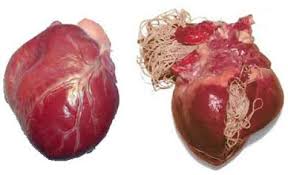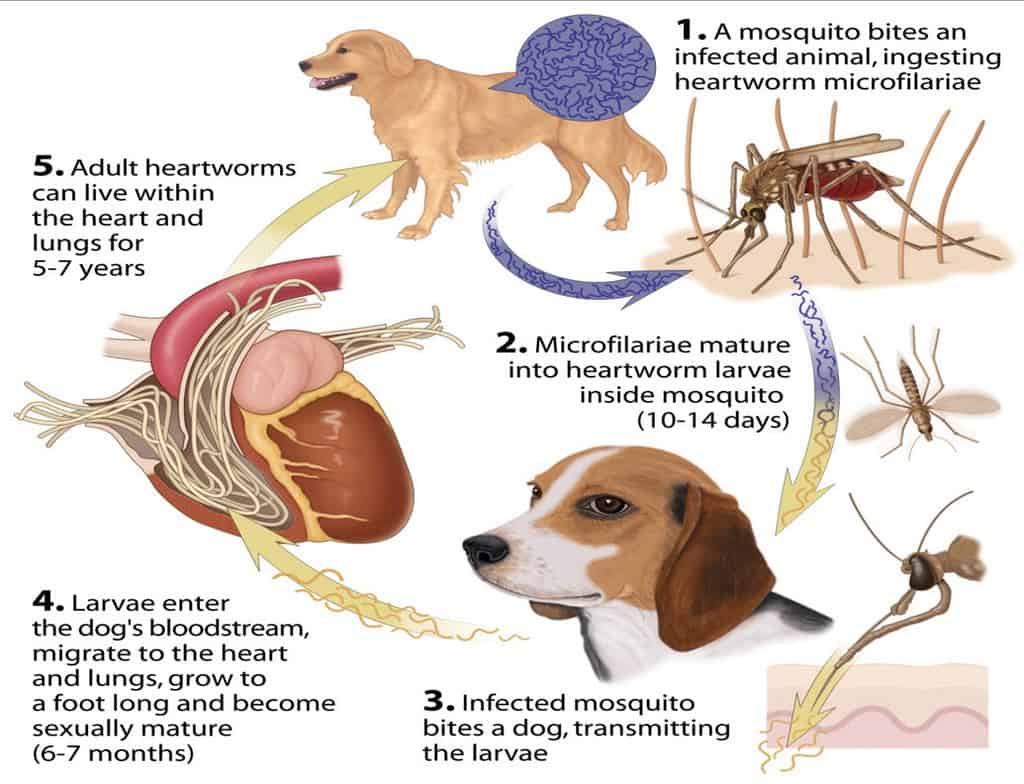What is Heartworm Disease?
Heartworm disease in Australian Shepherds is caused by a parasite called Dirofilaria Immitis and is transmitted through mosquito bites. It is very important to prioritize protecting our dogs from the heartworm because it is a severe disease and potentially deadly. Treatment options for heart worm disease are very risky, painful, and expensive. The good news is that preventing the disease is very simple and easy. There are many options of preventative.

Examples include a monthly pill and injections that can last from 6 to 12 months.
To better understand how the prevention works and why it is important to make sure your dog is always current on it, let’s talk a little more about the parasite.
Heartworm larvae (microfilaria) live in the mosquito. The infected mosquito bites your dog and transmits larvae in your dog’s bloodstream during the feeding process. These larvae go through many stages so they can mature before they reach the heart.
Inside the heart is where the worm is considered an adult and starts reproducing. The more they reproduce, the more larvae are released into the bloodstream and myriad worms reach the heart. The more adult worms living in the heart, the more severe the disease and symptoms. Also, the dog serves as a reservoir of larvae to infect other dogs.

What are some of the symptoms we should watch for?
The adult worms will remain in the heart and your dog will show symptoms of heart disease such as cough (with or without blood), exercise intolerance (getting tired more easily while doing the same amount of exercise), trouble breathing (more severe cases when it progresses to heart failure).
The treatment involves killing the microfilariae in the circulating blood as well as the adult worms inside the heart. The tricky part is that the treatment can be very expensive, painful, and very risky. When the worms die, they can release substances in the dog’s body that can cause allergic reactions. Also, fragments of dead worms can enter the bloodstream and obstruct vessels, potentially worsening the situation.
Now that you know a little more about the disease you understand why it is so important to prevent it!

How can we protect our dogs against heartworm?
Well that is easy. Heartworm preventatives are prescription only medication in the United States, which means they can only be prescribed or authorized by a veterinarian. The reason for that is that if a dog is heartworm positive and the heartworm prevention is given it can actually cause a severe allergic reaction. That happens because the preventative will kill all the circulating larvae at once and it these larvae release a substance that can potentially cause the allergy.
That is the reason why your veterinarian won’t be able to prescribe heartworm prevention without making sure your pet tests negative for heartworm.
The heartworm test only needs 3 drops of blood and it takes about 5 minutes to generate results. The great news is that the most common heartworm test also tests against other diseases. These diseases can be transmitted by ticks, such as lyme disease and blood parasites (Ehrlichia and Anaplasma). As long as your dog is current on his heartworm prevention, the test is performed once a year in order to have the medication refilled. If you miss 5 months or more of prevention your dog will need to be retested because he could potentially have been infected during this time.
Prevention consists in killing the circulating larvae before they get to the heart. The preventatives available today just kill the early stage of larvae. This is why prevention has to be given consistently every month in the case of oral tablets, or once every 6 months in case of the injection. If the larvae are older than that specific stage targeted, the prevention won’t work.
So what are the options of prevention we can choose from?
There are multiple monthly preventative tablets that differ on the actual medicine, but remain equally effective. The 3 main agents are ivermectin, milbemycin oxime and moxidectin. Talk to your veterinarian to decide which is the better option for your dog. It also depends on how easy your dog can swallow tablets. As well as if you will remember to give the tablets monthly. If you prefer an injection that can be done twice a year. Most of the tablets are made on the form of a palatable treat so usually the dogs love to eat them.
What is important to know if you’re an Australian Shepherd owner?
Australian Shepherds owners have probably heard that heartworm preventatives are made of drugs that could potentially cause adverse effects in MDR1 mutant dogs. They are scared of protecting their dog against this terrible disease. It is true that these medicines are on the least of possible danger for MDR1 positive dogs. However, that risk is dose related.
Luckily the dosage required to kill the heartworm larvae is very small, so these medications are still safe to use even in MDR-1 affected dogs.
There is no need to be scared of keeping your dog safe! Heartworm disease is very severe but the prevention is very easy.

Conclusion
Now that you know more about it schedule a visit with your veterinarian and get your dog tested right away. Once you start the prevention make sure you mark the date on your calendar. Place a reminder on your cell phone to keep it current and not miss any dose.
If you want to read more about the heartworm disease, prevention and treatment guidelines visit the website of the American Heartworm Society. They are an excellent source of information for pet owners and also veterinarians.

